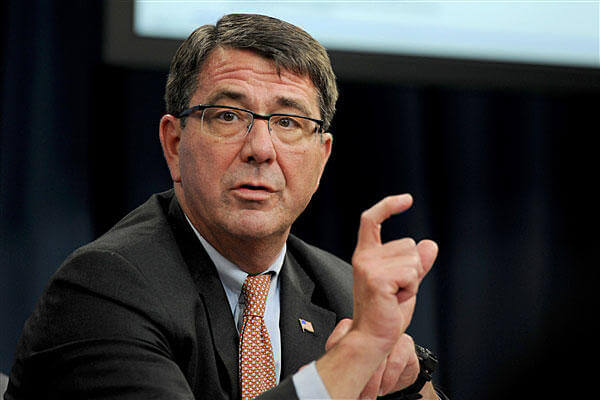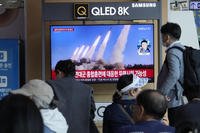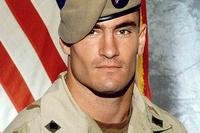Former Defense Secretary Ashton Carter was the expected choice Tuesday of President Obama to succeed Chuck Hagel as defense secretary in a move to find a quick replacement as the country fights Islamic military and faces budget uncertainty.
The White House and the Pentagon did not immediately confirm the choice of Carter, first reported by CNN, but Carter's status as the frontrunner also was not disputed.
"I'm obviously mindful of the swirl" of speculation on Hagel's replacement, Rear Adm. John Kirby, the Pentagon press secretary, said at an afternoon briefing.
"I have no information on who the nominee might be. This is a decision only the President can make and only the President can announce," Kirby said.
White House officials had no comment on the reports and said there were no immediate plans to make an announcement Tuesday.
Obama met with Hagel privately at the White House in the morning and later went to the Walter Reed National Military Medical Center in Bethesda, Maryland, to visit wounded troops and also to discuss with public health officials a vaccine for Ebola.
White House Press Secretary Josh Earnest said "What I can tell you is not much – don't have any personnel announcements."
The 60-year-old Carter and current Deputy Defense Secretary Robert Work, 61, were believed to be strong contenders for the defense secretary's post after others took their names out of consideration, including Sen. Jack Reed, D-Rhode Island, Homeland Security Secretary Jeh Johnson and Michelle Flournoy, the former undersecretary of Defense for Policy.
Carter, a Rhodes Scholar with a doctorate in theoretical physics, never served in the military. Work served 27 years as a Marine artillery officer and retired in 2001 as a colonel.
"Great, very highly qualified," Sen. Carl Levin, D-Mich., the outgoing chairman of the Senate Armed Services Committee, said of Carter's possible nomination. Sen. John McCain, R-Ariz., who will replace Levin as SASC chairman next month, described Carter as a "non-controversial" pick, the Washington Post reported.
Both senators said they had no inside information that Carter would be the eventual nominee. Reuters reported that a spokeswoman for Carter had no comment on his potential selection.
Carter was called a "highly qualified" candidate who would "fit into the Obama stereotype as an academic rather than a captain of industry or a warfighter," said Loren Thompson, head of the Lexington Institute and a Pentagon consultant.
"He knows the building inside and out," Thompson said, "and he's the only first tier candidate still standing." Work was seen more as "an internal operator" and not one suited to be the public face of the Pentagon, Thompson said.
The choice of Carter to serve as Defense Secretary would be the fourth in Obama's six years in office, following Robert Gates, Leon Panetta and Hagel. Hagel served just under two years in the post.
A main consideration of the White House in picking a Hagel successor was the avoidance of a lengthy nomination process to get a quick confirmation. Hagel has pledged to remain at the Pentagon until his successor is confirmed by the Senate.
Carter has already gone through the background vetting by the SASC in 2012 hearings on his nomination as deputy secretary.
Another consideration of the White House was the avoidance of a repeat of the contentious hearings that Hagel faced and damaged his ability to take control at the Pentagon. McCain has already gone on record in praise of Carter for his oversight of acquisitions at the Pentagon.
However, Carter could be expected to face tough questions on his shepherding as deputy secretary of the F-35 Joint Strike Fighter program, the most expensive weapons system ever developed by the Pentagon.
However, Thompson said "I don't think Ash has much to apologize over on the F-35. He slowed down the program to make sure it was done right."
Another point of contention could be Carter's backing of the controversial purchase of Mi-17 helicopters from Afghanistan from the Russian arms firm Rosobornexport, which has been supplying weaponry to the regime of Syrian President Bashar al-Assad.
The possible choice of Carter came only eight days after Hagel's surprise resignation following reported disputes with White House National Security Adviser Susan Rice and other White House policy officials over the alleged "micromanagement" of the Pentagon from the Oval Office and the way forward against the Islamic State of Iraq and Syria (ISIS).
Carter's own resignation as deputy secretary in late 2013 also came as a surprise following reports that he had been passed over for the defense secretary position in favor of Hagel.
Before he served as deputy defense secretary, the No. 2 post at the Pentagon, Carter was the Pentagon's technology and weapons-buying chief for more than two years.
-- Richard Sisk can be reached at richard.sisk@monster.com






























